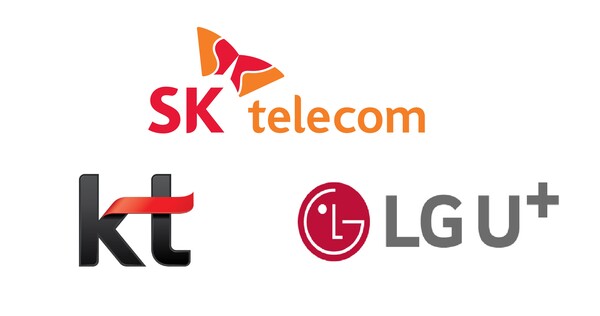One of the very first things you need to do when coming to study in Korea is to set up your mobile phone service. Nowadays, smartphones are essential for daily life — from getting school information and navigating directions to ordering food delivery and connecting with transportation cards. Without a phone, life can become quite inconvenient. In Korea, there are three major telecom providers — SK Telecom (SKT), KT, and LG Uplus (LG U+) — plus a variety of MVNO (budget phone) operators, making it tricky to decide which one to choose.
In this article, we’ll go over the features and pricing plans of major telecom companies for international student mobile phone, explain what MVNOs are, and explore how you can save money while still enjoying convenience when choosing a phone plan as a foreign student.
1) Overview of the Korean Telecom Market
The Korean mobile market is dominated by three major providers that cover most of the market share, offering wide-ranging networks from the latest 5G to 4G LTE and even 3G. These major telcos boast excellent nationwide coverage and a variety of added benefits such as membership perks, discounts, and content services. However, their basic monthly fees tend to be relatively high, which might be a burden for students on a tight budget.
On the other hand, MVNO (budget phone) operators lease networks from the major telcos and sell plans at lower prices. The service conditions — data, voice, and SMS — are usually similar with some minor limitations, but the value for money is excellent, attracting many consumers. If you have an Alien Registration Card (ARC) as a foreign student, you may be able to sign up for both major telcos and MVNOs, so it’s worth making a detailed comparison.

2) Comparison of Major Telcos: SKT, KT, LG U+
SK Telecom (SKT)
As Korea’s number one telecom provider, SKT offers stable coverage and service quality. With plenty of membership perks (such as movie and café discounts), it’s very practical for students who use these benefits often. They offer a variety of 5G and LTE plans, and although prices are slightly higher than competitors, it may be worth it if you value gifts or membership benefits. Large discounts are available with family or Internet+TV bundles, but for international students living alone, these might not be very advantageous.
KT
KT’s strength lies in its internet infrastructure and Wi-Fi network. Some plans provide free access to KT WiFi in public places such as subway stations, and they offer strong bundle discounts for combining giga internet with mobile service. If you frequently use international roaming or make overseas calls, KT’s international communication packages are worth a look. Their pricing is similar to SKT, and they offer a wide variety of plans, so it’s important to choose one that fits your usage pattern.
LG U+
LG U+ targets the MZ generation (Millennials and Gen Z) with bundled media service plans including Netflix, YouTube Premium, and gaming options, as well as cloud gaming services. Their 5G network is stable in Seoul and the metropolitan area, but coverage in rural areas is sometimes considered weaker than SKT or KT. However, if you take advantage of contract discounts and promotions, you can end up paying significantly less. They also operate a foreign customer support center with English-speaking assistance, which can help new international students overcome language barriers.
3) What is an MVNO (Budget Phone)?
MVNO stands for Mobile Virtual Network Operator — these companies lease the infrastructure from major telcos and sell their own branded phone plans, usually called “budget phones” in Korea. The main advantage is a much lower monthly fee compared to major carriers. Plans range from unlimited data to small-data options, and because they use the same networks (e.g., SKT network, KT network, LG network), call quality and data speeds are almost the same as with major providers.
However, MVNO customer service centers are generally smaller, and some services may be unavailable — for example, major carrier perks like T membership, data sharing, or certain bundled services are often not offered by MVNOs. For an international student who prioritizes cheap monthly fees over perks, budget phones can be a very reasonable choice.
4) Examples of MVNO Providers and Sign-Up Process
There are dozens of MVNO providers in Korea, such as Hello Mobile (LG HelloVision), SK Seven Mobile, KT M Mobile, U+ Budget Mobile, and others like A Mobile, FreeT, and SmarTel. You can simply order a SIM (USIM) card online, have it delivered to your home, and start the activation process. Some providers have offline stores where you can sign up in person by presenting your ID.
For foreigners, an Alien Registration Card (ARC) along with a passport or a domestic credit card may be required, so check in advance. Many plans have no contracts and can be canceled on a monthly basis, allowing you to use the service for just your study period and cancel when you return home.
5) How to Choose a Plan
International students should consider data usage, international calls or roaming needs, and calling/texting patterns. For instance, if you spend most of your time on campus with Wi-Fi access, you may need less mobile data. However, if you frequently use maps, YouTube, or social media on the go, you’ll want a plan with generous data.
Major carriers offer both 5G and LTE plans, and MVNOs also support LTE and sometimes 5G. While 5G plans are more expensive, the difference in real-world usage may not always justify the cost — LTE may be sufficient. Whether you need 5GB, 10GB, or unlimited data per month will greatly affect your plan’s cost, so understanding your usage habits is crucial.
6) Online Activation & SIM Verification
Nowadays, you can apply for activation online. Simply visit the website of a major carrier or MVNO, choose your plan, and order a SIM (USIM) card. Within 1–2 days, it will be delivered to your home, and you can follow the instructions to upload your ID (Alien Registration Card) photo and verify your identity for activation. Once completed, insert the SIM into your phone, and you can start using the service immediately.
Keep in mind that some devices (especially phones brought from overseas) may not be compatible with Korean networks due to frequency band issues. If possible, buy an unlocked phone in Korea or confirm in advance whether your overseas unlocked phone supports Korean bands.
7) Contract Period & Early Termination
Major telcos usually promote long-term contracts. With a two-year contract, you can receive handset installment discounts and monthly plan discounts (choice contracts). However, if you plan to stay for only about a year, you may face hefty early termination fees. With MVNOs, most plans have no contracts and can be canceled anytime, so buying your own phone separately and just using an MVNO SIM can often be more cost-effective.
That said, if you utilize major telco promotions well, you may be able to get a new phone at a lower price and monthly discounts, so if you plan to study for 2 years or more, it could be worth considering. Just make sure to check the early termination fees, how public subsidies and choice contract discounts apply, and other important details.
8) Data Roaming vs. Local Plan
Some students consider keeping their home country SIM card and using international roaming. However, for long-term stays, local Korean plans are far cheaper and more convenient. You can keep your home SIM on the cheapest plan just for number retention and use your Korean SIM as the primary one. When traveling abroad temporarily, you can use roaming from your Korean SIM instead.
If you need to make international calls, services like Skype or KakaoTalk Voice Call are commonly used, so you don’t necessarily need to pay for expensive international calling packages. As long as your Korean plan provides sufficient data, you can handle calls via VoIP or messenger apps.
9) Device Purchase Strategy
Where you buy your smartphone is also important. Purchasing from a major telco store allows you to get contract discounts and public subsidies, but you may be tied to that carrier for a certain period. Buying an unlocked phone (SIM-free) from an online or offline retailer, then using it with an MVNO SIM, is also a popular option.
For international students, buying a used phone is another good choice. You can get a relatively new phone at a lower price via second-hand markets (like Bungaejangter or Karrot Market) and pair it with a budget SIM to lower your monthly costs. Be sure to verify that the used phone is not lost/stolen and has been properly released from its previous contract.
10) Conclusion: Finding the Best Option for You
Ultimately, choosing a carrier depends on factors like “How long will you be in Korea?”, “How much data will you use?”, and “Do you need perks like memberships or extra services?”. If you plan to stay long-term, want unlimited 5G, and value perks like movie discounts, it might make sense to sign a two-year contract with SKT, KT, or LG U+. On the other hand, if you are staying less than a year or only need basic internet surfing and messaging, an MVNO plan (such as LTE 10GB) will be cheaper and more flexible.
Major carrier stores are located nationwide, and some offer English assistance, so visiting a store for consultation when you first arrive is a good idea. MVNOs typically focus on online sign-ups, so you’ll need some ability to read Korean websites, which could be a small barrier. However, once you get used to the process, both major and MVNO plans can be easily started or canceled online, so it shouldn’t be a big challenge for international students.
Lastly, when signing up, make sure you prepare all necessary documents like your Alien Registration Card and passport, and carefully check the terms of the contract, early termination fees, and details of the plan (voice, text, data) to avoid issues. Korea is known for having one of the world’s most advanced internet and telecom infrastructures, so once you’re set up, your student life here will become much more convenient.


K-Name Studio: Create your perfect Korean name based on your personality and style.
What’s My K-Beauty Personal Color?
WeBring Service : Provides personalized services to foreigners living in Korea
Exclusive offer: Introducing foreign car rental in Korea, WeBring-SoCar

